Brex vs Mercury: Choosing your financial platform
- 01Brex vs Mercury: overview
- 02What's the difference between Brex and Mercury?
- 03Brex pros and cons
- 04Mercury pros and cons
- 05Brex compared to Mercury
- 06Mercury compared to Brex
- 07Features comparison
- 08Brex vs Mercury: Which is the best for your business?
- 09Promotions on Online Banking software
- 10Alternatives to Brex & Mercury
Access up to $500 savings on Brex & $500 on Mercury
Access up to $500 savings on Brex & $500 on Mercury
Business banking solutions are crucial for managing finances effectively and optimizing operations. However, with numerous options available, selecting the most suitable platform can be a daunting task.
If you're facing this dilemma, you're in the right place. In this comparison, we'll delve into two prominent business banking platforms: Brex and Mercury. We'll examine their key features, pricing structures, and customer support services. By the end of this article, you'll have a clear understanding of which platform aligns best with your business needs.
Brex vs Mercury: overview
Brex and Mercury are two prominent contenders in the realm of business banking, each boasting distinct advantages tailored to cater to different user requirements.
Brex stands out for its innovative approach and focus on providing financial solutions tailored to the needs of startups, e-commerce businesses, and technology companies. With features such as expense management, corporate cards, and tailored rewards programs, Brex aims to streamline financial workflows for modern businesses. In contrast, Mercury offers a robust suite of banking tools designed to empower small businesses and startups with easy access to essential banking services. With features like online checking accounts, savings accounts, and integrations with popular accounting software, Mercury provides a comprehensive banking solution for entrepreneurs and small business owners.
Now, let's explore the Brex vs. Mercury comparison to assist you in making an informed decision when selecting the ideal business banking platform for your specific requirements and objectives.
What's the difference between Brex and Mercury?
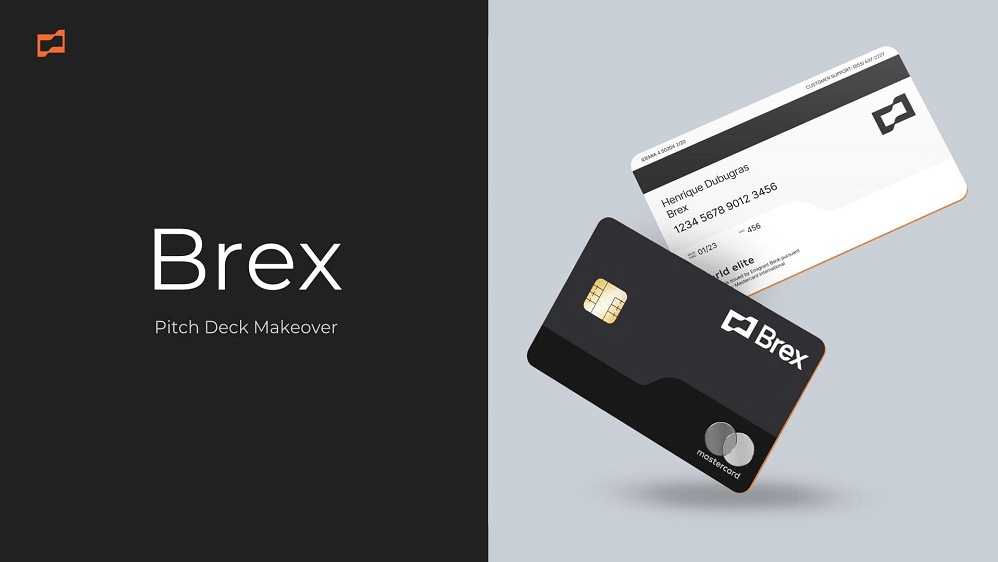
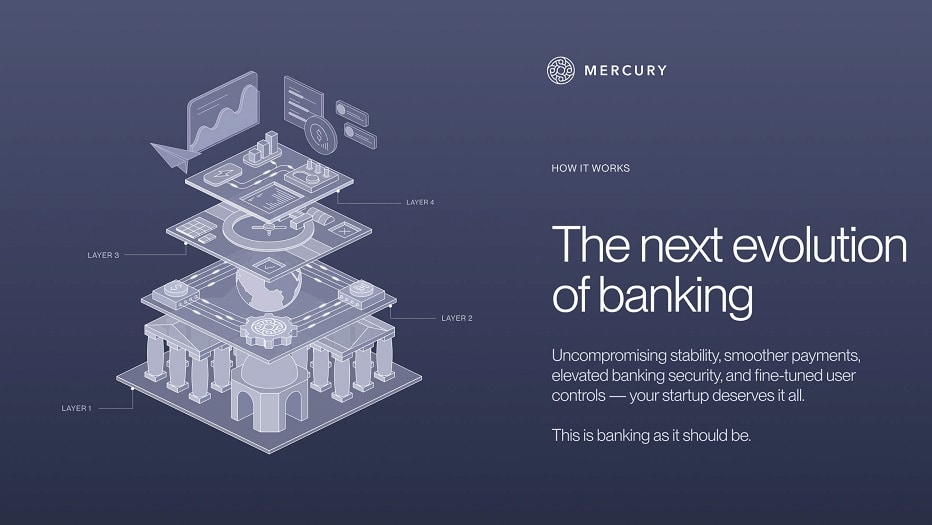
When comparing Brex and Mercury, several key differences emerge that can help you determine which platform best suits your business needs. Firstly, Brex is tailored towards startups, e-commerce ventures, and technology companies, offering specialized financial solutions such as expense management tools, corporate cards, and personalized rewards programs. In contrast, Mercury caters to small businesses and startups, providing essential banking services like online checking and savings accounts, along with integrations with popular accounting software.
Another significant distinction lies in their approach to banking services. Brex prioritizes innovation and efficiency, aiming to streamline financial workflows for modern businesses. Its platform is designed to offer a seamless user experience, with intuitive interfaces and cutting-edge features. On the other hand, Mercury focuses on providing accessible and straightforward banking solutions, emphasizing ease of use and reliability for entrepreneurs and small business owners.
When it comes to account management, Brex and Mercury also differ in their offerings. Brex provides a suite of financial tools tailored to the specific needs of startups, offering features like expense tracking, budgeting, and real-time insights into company spending. In contrast, Mercury offers a more traditional banking experience, with standard checking and savings accounts, along with features like mobile banking and online bill pay.
If you're a startup or technology company looking for innovative financial solutions, Brex may be the ideal choice. However, if you're a small business or entrepreneur seeking accessible banking services with a focus on simplicity and reliability, Mercury could be the better option.
Brex pros and cons
What are the advantages of Brex?
- Tailored for startups: Brex understands the unique needs of startups and offers specialized financial solutions, including corporate cards, expense management, and credit options, designed to support early-stage companies.
- Fast application process: Brex offers a streamlined application process with minimal paperwork, allowing startups to quickly access essential financial services without the lengthy approval times associated with traditional banks.
- Generous rewards program: Brex offers a lucrative rewards program tailored to startup spending habits, providing high cashback rates on categories such as software subscriptions, marketing expenses, and travel, helping companies save money on essential business purchases.
- Innovative features: Brex continually introduces innovative features to improve the financial management experience for startups, such as real-time expense tracking, integration with popular accounting software, and customizable spending controls.
- No personal guarantees: Unlike traditional credit cards, Brex corporate cards do not require founders to provide personal guarantees, protecting their personal assets in case of business-related liabilities or debt.
What are the disadvantages of Brex?
- Limited availability: Brex's services are primarily targeted towards startups and technology companies, limiting its availability to businesses operating outside of these industries.
- Higher fees: While Brex offers valuable features and rewards, its fees may be higher compared to traditional business banking options, especially for companies with lower spending volumes or fewer employees.
- Credit limit determination: Brex's credit limits are determined based on a company's financial health and spending patterns rather than individual credit scores, which may result in lower limits for some businesses.
- Lack of physical branches: Brex operates entirely online, which may be a drawback for businesses that prefer in-person banking services or need access to physical branches for cash deposits or other transactions.
- Limited international acceptance: While Brex corporate cards are widely accepted in the United States, they may have limited acceptance internationally, which could be a disadvantage for companies with significant overseas operations or travel requirements.
Compare Brex to other tools
Mercury pros and cons
What are the advantages of Mercury?
- Digital banking solutions: Mercury offers a range of digital banking solutions tailored for startups and small businesses, including online checking and savings accounts, expense tracking, and mobile banking, providing convenient access to essential financial services.
- No monthly fees: Unlike many traditional banks, Mercury does not charge monthly fees for its basic banking services, making it a cost-effective option for businesses looking to minimize banking expenses.
- Developer-friendly platform: Mercury provides APIs and developer tools to integrate banking services directly into business applications, enabling developers to build custom financial solutions and automate banking workflows.
- Free domestic wires and ACH transfers: Mercury allows businesses to send unlimited domestic wires and ACH transfers at no additional cost, helping companies save money on transaction fees and streamline their payment processes.
- Transparent pricing: Mercury offers transparent pricing with no hidden fees, making it easier for businesses to understand and manage their banking costs without unexpected charges.
What are the disadvantages of Mercury?
- Limited account options: Mercury primarily offers checking and savings accounts tailored for small businesses and startups, but it lacks additional banking products such as credit cards, loans, or merchant services, which may be a drawback for businesses with more complex financial needs.
- No physical branches: Mercury operates exclusively online, which may be a disadvantage for businesses that prefer in-person banking services or require access to physical branches for certain transactions or services.
- Limited international support: While Mercury offers convenient domestic banking solutions, its international banking capabilities are limited, which may be a drawback for businesses with significant international operations or cross-border payment requirements.
- Limited ATM access: Mercury does not have its own network of ATMs, so businesses may incur fees for using out-of-network ATMs, which could add to their banking costs.
- No cash deposits: Mercury does not support cash deposits, which may be inconvenient for businesses that handle cash transactions regularly and require a way to deposit funds into their accounts.
Brex compared to Mercury
Brex and Mercury offer distinct banking solutions for businesses. Brex caters primarily to startups and tech companies, providing innovative financial tools like corporate cards and expense management tailored to their needs.
On the other hand, Mercury targets small businesses and startups with digital banking services including online checking and savings accounts. Brex stands out for its generous rewards program and fast application process, while Mercury boasts transparent pricing and no monthly fees. Both platforms have their strengths, with Brex excelling in startup-focused features and rewards, while Mercury offers simplicity and developer-friendly tools for small businesses.
Is Brex better than Mercury?
Comparing Brex and Mercury involves looking beyond their core offerings to understand which service might better suit a business's unique requirements. While Brex is lauded for its suite of features designed to cater to the fast-paced world of startups, offering substantial rewards and a streamlined application process, Mercury presents itself as a compelling alternative for those valuing straightforward, cost-effective banking solutions.
Mercury's appeal lies in its clear pricing structure and absence of monthly fees, alongside a set of tools that appeal to developers and small businesses seeking simplicity and efficiency.
What is Brex best used for?
Brex is best used for startups, technology companies, and e-commerce ventures seeking innovative financial solutions. It offers specialized services such as corporate cards, expense management, and credit options tailored to the unique needs of these businesses. Brex's fast application process, lack of personal guarantees, and generous rewards program make it ideal for companies looking to streamline financial workflows, access credit without traditional requirements, and earn rewards on essential business purchases.
Additionally, Brex provides valuable features like real-time expense tracking and integration with popular accounting software, making it a comprehensive solution for managing finances efficiently in the modern business landscape.
Can Brex replace Mercury?
While Brex offers innovative financial solutions tailored for startups and technology companies, it may not entirely replace Mercury for all businesses. Brex excels in providing specialized services such as corporate cards, expense management, and rewards programs, which may be particularly beneficial for certain industries.
However, Mercury offers a broader range of digital banking solutions suitable for small businesses and startups, including online checking and savings accounts, with no monthly fees. While Brex may complement certain aspects of Mercury's offerings, businesses should carefully evaluate their specific banking needs to determine whether Brex can fully replace Mercury as their banking solution.
Is Brex cheaper than Mercury?
Determining whether Brex is cheaper than Mercury depends on various factors including the specific needs of a business and the services required. Brex’s pricing model may appear cost-effective due to its lack of monthly fees and competitive rewards program.
However, Brex’s pricing structure for additional services and features could differ from Mercury's offerings. Mercury, known for transparent pricing and no monthly fees, might be more affordable for businesses requiring basic banking services without additional expenses.
Is there a better Online Banking software than Brex?
While Brex provides innovative financial solutions tailored for startups and technology companies, it's crucial to explore alternative business banking platforms to find the optimal fit for your specific requirements.
Several notable alternatives to Brex in the business banking landscape include Mercury, Ramp, Pleo, Spendesk, and SAP Concur.
Choosing the best business banking platform depends on factors such as your company's size, industry, financial goals, and preferences. If you prioritize specialized services for startups, fast application processes, and generous rewards programs, Brex could be the ideal solution for your business banking needs.
50,000 points for $100,000 deposits in Brex business accounts on Brex
Get 50,000 points for $100,000 deposits in Brex business accounts on Brex and up to $500 savings with Secret.
Mercury compared to Brex
Mercury and Brex offer distinct banking solutions tailored for different business needs. Mercury targets small businesses and startups with digital banking services like online checking and savings accounts, emphasizing simplicity and transparency.
Brex, on the other hand, caters primarily to startups and tech companies, providing specialized financial tools such as corporate cards and expense management, with a focus on innovation and rewards programs. While Mercury excels in offering no monthly fees and developer-friendly tools, Brex stands out for its fast application process, generous rewards program, and startup-focused features.
Is Mercury better than Brex?
In the comparison between Mercury and Brex, determining which is superior hinges on a business's priorities and operational scale. Mercury shines with its commitment to straightforward, transparent banking solutions, making it an attractive option for small businesses and startups looking for easy-to-understand, fee-free banking experiences. Its emphasis on developer-friendly tools and simplicity in banking operations offers a clear advantage for those valuing ease of use and cost-effectiveness.
Conversely, Brex's appeal lies in its tailored services for startups and tech companies, focusing on innovation, rewards, and specialized financial tools.
What is Mercury best used for?
Mercury is best used for small businesses and startups seeking accessible and streamlined digital banking solutions. It offers online checking and savings accounts with no monthly fees, making it an attractive option for businesses looking to minimize banking expenses. Mercury's developer-friendly platform and APIs enable businesses to integrate banking services directly into their applications, simplifying financial workflows and automating processes.
Additionally, Mercury's transparent pricing and emphasis on simplicity make it ideal for entrepreneurs and small business owners who prioritize convenience and affordability in their banking services. Overall, Mercury provides a comprehensive banking solution tailored to the needs of modern businesses.
Can Mercury replace Brex?
While Mercury offers convenient digital banking solutions tailored for small businesses and startups, it may not entirely replace Brex for all companies. Mercury excels in providing accessible online checking and savings accounts with no monthly fees, along with developer-friendly tools for integrating banking services into business applications.
However, Brex offers specialized financial solutions such as corporate cards, expense management, and rewards programs, which may be essential for startups and technology companies. Whether Mercury can fully replace Brex depends on the specific banking needs, priorities, and preferences of a business, as well as the industry it operates in.
Is Mercury cheaper than Brex?
Determining whether Mercury is cheaper than Brex depends on various factors including the specific needs and usage patterns of a business. Mercury stands out for its transparent pricing and no monthly fees, making it an attractive option for businesses seeking cost-effective banking solutions.
However, Brex may offer competitive pricing for its specialized financial services such as corporate cards and expense management, alongside its rewards program. To accurately compare costs, businesses should consider their banking requirements, transaction volumes, and potential fees associated with additional services.
Is there a better Online Banking software than Mercury?
When evaluating business banking solutions, it's important to explore alternatives to Mercury to find the best fit for your specific needs.
Several notable alternatives to Mercury in the business banking landscape include Brex, Rippling, Expensify, Intercom, and Airbase.
Choosing the right business banking platform depends on factors such as your company's size, industry, financial goals, and preferences. If you prioritize simplicity, transparency, and accessible digital banking services without monthly fees, Mercury might be the ideal choice for your business.
Spend $10K on your debit card within 90 days of account approval and get $500. on Mercury
Get Spend $10K on your debit card within 90 days of account approval and get $500. on Mercury and up to $500 savings with Secret.
Features comparison
Both Brex and Mercury Offer Substantial Business Financial Insights

Both Brex and Mercury empower users with robust financial analysis tools to gain valuable insights into their businesses' financial performance. These tools include interactive dashboards that offer intuitive visualization of key financial metrics, allowing users to easily interpret and analyze their financial data. For example, Brex provides features like real-time expense tracking and customizable spending controls, enabling users to monitor expenses and optimize budget allocation effectively.
Similarly, Mercury offers comprehensive reporting tools, allowing users to generate detailed financial reports to track income, expenses, and cash flow trends over time. Overall, both platforms offer valuable financial analysis capabilities to support informed decision-making for businesses.
Brex Offers Comprehensive Business Solutions Beyond Banking Compared to Mercury

While both Brex and Mercury provide essential banking services and credit lines for businesses, Brex stands out with its integrated platform that extends beyond traditional banking functions. For instance, Brex offers features like fund storage and transfer, expense management, travel sourcing and booking, financing procurement, and automated invoice payments, streamlining various aspects of business operations.
Moreover, Brex's instant credit accessibility eliminates the need for personal guarantees and credit checks, exemplifying its dedication to facilitating seamless financial transactions for businesses. In contrast, while Mercury provides solid banking services, it lacks the extensive range of business solutions offered by Brex, making Brex a comprehensive choice for businesses seeking integrated financial management tools.
Mercury Leads in Mobile Accessibility Compared to Brex

When it comes to mobile convenience, Mercury outshines Brex with its dedicated mobile app compatible with both iOS and Android systems. This allows users to effortlessly manage their finances on the go, accessing essential banking services from their smartphones or tablets. For instance, with the Mercury mobile app, users can conveniently check account balances, review transaction history, and initiate transfers or payments anytime, anywhere.
In contrast, Brex does not specify offering a mobile application, potentially limiting users' ability to access and manage their finances conveniently from mobile devices. Therefore, for businesses prioritizing mobile accessibility, Mercury presents a superior option over Brex.
Brex Provides More Rewarding Benefits than Mercury
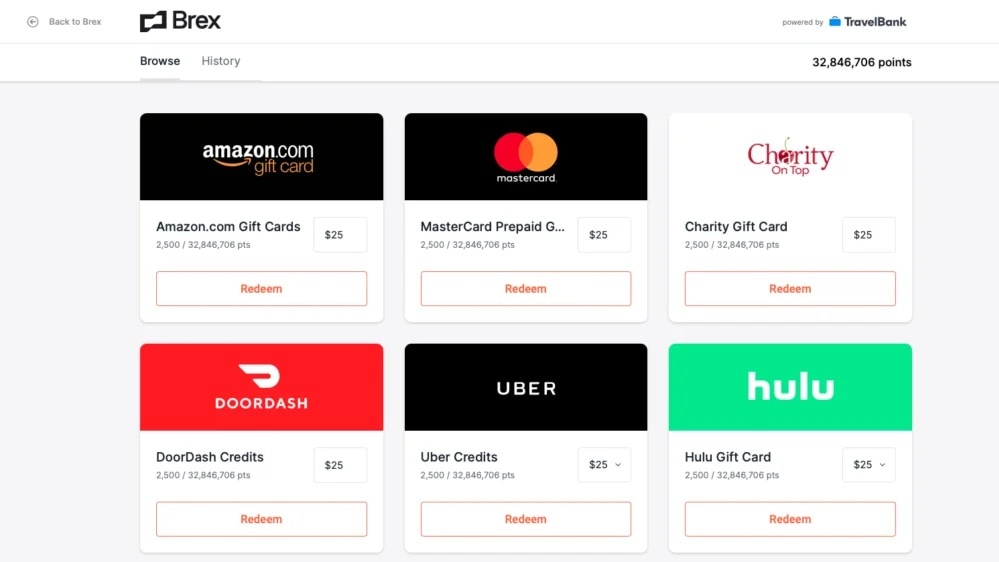
Brex surpasses Mercury in the realm of rewards programs, offering users the opportunity to earn points on every business purchase. These points can be redeemed for various rewards, including statement credits, travel expenses, or transfers to popular airline or hotel loyalty programs.
For example, Brex offers tailored rewards for startups and technology companies, such as cash back on software subscriptions, advertising, and travel expenses, providing substantial value to users. In contrast, while Mercury provides essential banking services, it does not offer a comparable rewards program, limiting users' ability to earn rewards on their business spending.
Brex's Exceptional Integration Capabilities Outshine Mercury
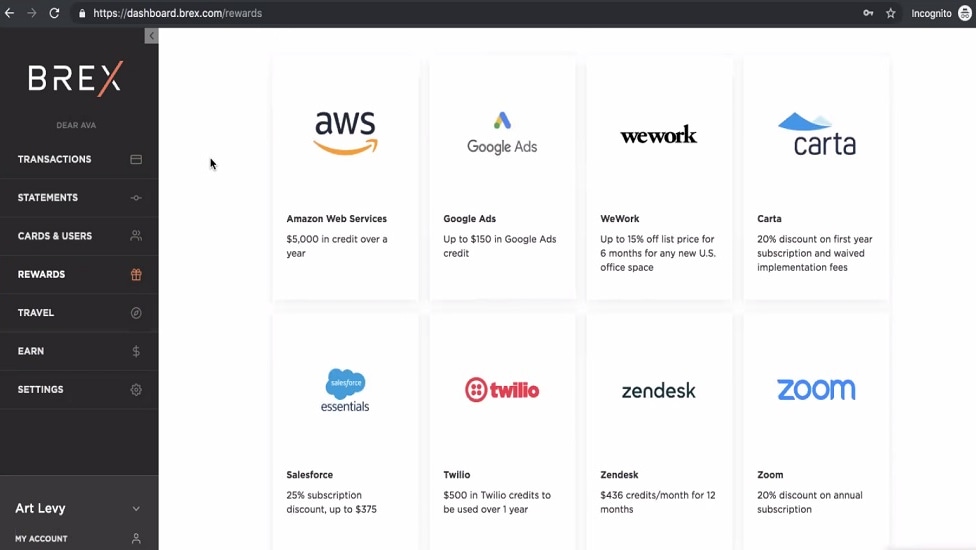
Brex emerges as the superior choice when compared to Mercury for integrations. Brex offers a wide array of integration options that seamlessly connect with popular accounting software, expense management platforms, and other essential business tools. For instance, Brex integrates effortlessly with accounting software like QuickBooks and Xero, allowing for seamless data synchronization and financial management.
Additionally, Brex's API capabilities enable businesses to build custom integrations tailored to their specific needs, providing unparalleled flexibility and scalability. In contrast, while Mercury offers some integration options, it does not offer the same level of comprehensive integration capabilities as Brex, making Brex the preferred choice for businesses seeking seamless integration solutions.
Brex Provides Enhanced Security Measures Compared to Mercury

While both Brex and Mercury prioritize user security, Brex offers superior levels of protection. Brex's robust security framework includes SOC 2 certification and PCI DSS compliance, guaranteeing a high standard of data protection for users. For instance, these certifications ensure that Brex maintains strict controls over data privacy and security practices, mitigating the risk of unauthorized access or data breaches.
Additionally, Brex offers advanced security features such as multi-factor authentication, further enhancing data confidentiality and safeguarding against potential security threats. In contrast, while Mercury provides basic security measures, it does not offer the same level of comprehensive security features as Brex.
Brex Simplifies Banking Experience for Entrepreneurs Compared to Mercury
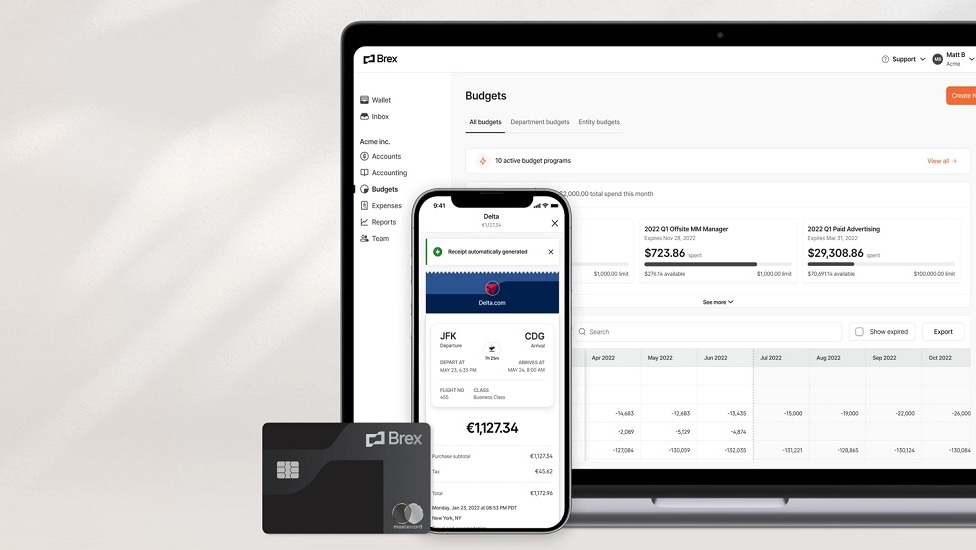
When it comes to user-friendliness, Brex emerges as the leader. While both Brex and Mercury boast clean, intuitive interfaces, Brex sets itself apart with its enhanced simplicity and elegance. For instance, Brex's dashboard offers straightforward navigation and easy-to-understand visuals, facilitating seamless management of business finances. Additionally, Brex provides intuitive transaction categorization features, simplifying expense tracking and budget management.
Furthermore, Brex's responsive customer service ensures entrepreneurs receive prompt assistance whenever needed, enhancing the overall user experience. In contrast, although Mercury offers a competent platform, some users have reported encountering a steeper learning curve, particularly when navigating complex banking functionalities.
Subscribe to our newsletters.
No FOMO here. Stay up-to-date on all the latest deals and news with our monthly newsletter straight to your inbox like 113,000+ entrepreneurs (+ Get 10% off on on our Premium Membership!)
Brex vs Mercury: Which is the best for your business?
Brex is the best tool for you if:
- You're part of a startup or tech company seeking a financial platform that offers innovative tools such as corporate cards and advanced expense management tailored to your dynamic needs.
- You prioritize a rewards program that generously compensates your spending, with benefits that align closely with the needs of rapidly scaling businesses looking to maximize every dollar spent.
- A fast, streamlined application process is crucial for your business, allowing you to quickly access financial services and focus on growth without bureaucratic delays.
- You require a suite of financial services that not only manages your expenses efficiently but also integrates seamlessly with other tech platforms, enhancing your operational workflow.
- Your business values financial partners that understand the startup ecosystem, offering resources, network opportunities, and financial products designed to support your journey from launch to scale.
Mercury is the best tool for you if:
- You're a small business owner or startup looking for a digital banking platform that prioritizes simplicity, transparency, and ease of use without the burden of monthly fees.
- You value a banking service that offers straightforward pricing and a commitment to no hidden fees, ensuring your financial operations are cost-effective and predictable.
- Developer-friendly tools and API integrations are vital to your business, enabling you to customize your banking experience and automate financial processes efficiently.
- You appreciate the importance of having online checking and savings accounts that can be managed entirely digitally, offering flexibility and convenience for your business operations.
- Your business seeks a banking partner that supports your growth with scalable solutions, from easy account management to seamless integration with other financial tools and services.
Alternatives to Brex & Mercury
Promotions on Online Banking software
Start saving on the best SaaS with Secret.
Secret has already helped tens of thousands of startups save millions on the best SaaS like Brex, Mercury & many more. Join Secret now to buy software the smart way.













